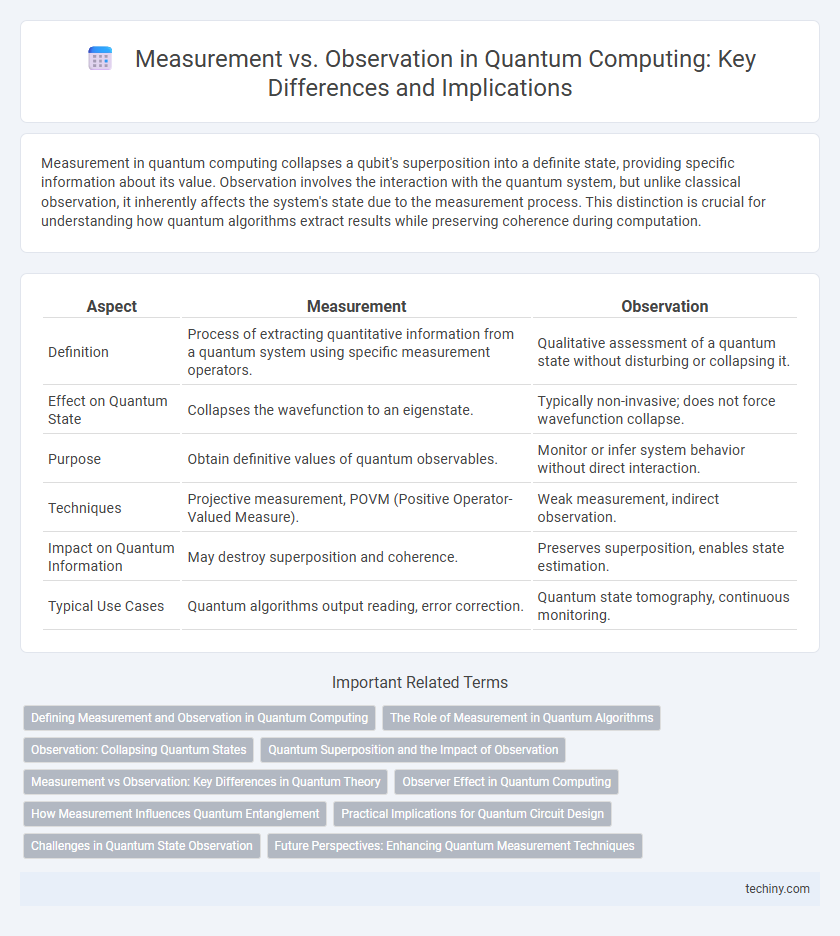Measurement in quantum computing collapses a qubit's superposition into a definite state, providing specific information about its value. Observation involves the interaction with the quantum system, but unlike classical observation, it inherently affects the system's state due to the measurement process. This distinction is crucial for understanding how quantum algorithms extract results while preserving coherence during computation.
Table of Comparison
| Aspect | Measurement | Observation |
|---|---|---|
| Definition | Process of extracting quantitative information from a quantum system using specific measurement operators. | Qualitative assessment of a quantum state without disturbing or collapsing it. |
| Effect on Quantum State | Collapses the wavefunction to an eigenstate. | Typically non-invasive; does not force wavefunction collapse. |
| Purpose | Obtain definitive values of quantum observables. | Monitor or infer system behavior without direct interaction. |
| Techniques | Projective measurement, POVM (Positive Operator-Valued Measure). | Weak measurement, indirect observation. |
| Impact on Quantum Information | May destroy superposition and coherence. | Preserves superposition, enables state estimation. |
| Typical Use Cases | Quantum algorithms output reading, error correction. | Quantum state tomography, continuous monitoring. |
Defining Measurement and Observation in Quantum Computing
Measurement in quantum computing refers to the process of extracting classical information from a quantum system by collapsing its wavefunction into a definite state, often represented in a computational basis. Observation involves the interaction with a quantum system that may cause partial or complete decoherence, influencing the system's evolution without necessarily providing a direct classical outcome. Distinguishing measurement from observation is critical for quantum error correction and quantum information theory, as measurement induces irreversible state collapse while observation can be a subtler interaction affecting coherence.
The Role of Measurement in Quantum Algorithms
Measurement in quantum algorithms collapses qubits from a superposition into definite states, enabling the extraction of computational results. It directly influences algorithm efficiency by determining the probability distribution of outcomes, critical in algorithms like Grover's search and Shor's factoring. Precise measurement strategies optimize success rates and reduce errors in quantum computation.
Observation: Collapsing Quantum States
Observation in quantum computing triggers the collapse of quantum states from superposition to a definite state, fundamentally altering the system's wavefunction. Unlike classical measurement, this process is inherently probabilistic, governed by the Born rule, which quantifies the likelihood of each possible outcome. Understanding quantum observation is crucial for designing algorithms and error-correction methods that harness or mitigate state collapse in quantum processors.
Quantum Superposition and the Impact of Observation
Quantum superposition allows particles to exist in multiple states simultaneously until measured, collapsing the wavefunction into a definite state. Measurement in quantum computing forces this collapse, determining a specific outcome crucial for quantum algorithms' functionality. Observation impacts quantum systems by altering their state, posing challenges for preserving coherence and harnessing superposition for computational advantage.
Measurement vs Observation: Key Differences in Quantum Theory
Measurement in quantum theory involves the active process of interacting with a quantum system to extract information, often causing wave function collapse and altering the system's state. Observation, by contrast, refers to the passive receipt of information without necessarily disturbing the quantum state. The key difference lies in measurement's role in defining observable outcomes through specific operators, while observation may not result in state change or definitive eigenvalue assignment.
Observer Effect in Quantum Computing
Measurement in quantum computing inherently alters the quantum state due to the Observer Effect, collapsing superposition into a definite eigenstate and impacting computational outcomes. This phenomenon challenges the preservation of coherence and entanglement, critical for quantum algorithms' efficiency. Understanding the Observer Effect is essential for advancing error correction and developing non-invasive measurement techniques in quantum information processing.
How Measurement Influences Quantum Entanglement
Measurement in quantum computing collapses the entangled quantum states into definite outcomes, directly influencing quantum entanglement by breaking the superposition. The act of measurement disrupts the correlation between entangled qubits, causing decoherence that eliminates their shared quantum properties. This fundamental principle impacts quantum algorithms by limiting the persistence of entanglement during computational operations.
Practical Implications for Quantum Circuit Design
Measurement in quantum computing collapses qubit superposition into a definite classical state, directly impacting circuit outcomes and error rates. Observation, often implying indirect or non-destructive monitoring, requires carefully designed quantum error correction or quantum non-demolition techniques to preserve coherence. Effective quantum circuit design balances these measurement constraints to optimize computational fidelity and minimize decoherence.
Challenges in Quantum State Observation
Quantum state observation faces significant challenges due to the collapse of superposition upon measurement, which irreversibly alters the quantum system. The act of measurement introduces decoherence, complicating the accurate retrieval of quantum information. Developing non-invasive measurement techniques remains crucial for advancing reliable quantum state characterization.
Future Perspectives: Enhancing Quantum Measurement Techniques
Quantum measurement techniques are poised for significant advancements through the integration of error-correcting codes and adaptive measurement strategies that improve accuracy and reduce decoherence. Emerging methods such as weak measurement and quantum tomography are expected to provide deeper insights into quantum states without fully collapsing them. These innovations will drive the development of more reliable quantum sensors and scalable quantum processors, enhancing practical applications in cryptography and complex problem-solving.
Measurement vs Observation Infographic

 techiny.com
techiny.com